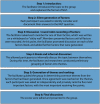What factors are important for deprescribing in Australian long-term care facilities? Perspectives of residents and health professionals
- PMID: 26966056
- PMCID: PMC4800122
- DOI: 10.1136/bmjopen-2015-009781
What factors are important for deprescribing in Australian long-term care facilities? Perspectives of residents and health professionals
Abstract
Objectives: Polypharmacy and multimorbidity are common in long-term care facilities (LTCFs). Reducing polypharmacy may reduce adverse events and maintain quality of life. Deprescribing refers to reducing medications after consideration of therapeutic goals, benefits and risks, and medical ethics. The objective was to use nominal group technique (NGT) to generate then rank factors that general medical practitioners (GPs), nurses, pharmacists and residents or their representatives perceive are most important when deciding whether or not to deprescribe medications.
Design: Qualitative research using NGT.
Setting: Participants were invited if they worked with, or resided in LTCFs across metropolitan and regional South Australia.
Participants: 11 residents/representatives, 19 GPs, 12 nurses and 14 pharmacists participated across six separate groups.
Methods: Individual groups of GPs, nurses, pharmacists and residents/representatives were convened. Using NGT each group ranked factors perceived to be most important when deciding whether or not to deprescribe. Then, using NGT, the prioritised factors from individual groups were discussed and prioritised by a multidisciplinary metropolitan and regional group comprised of resident representatives, GPs, nurses and pharmacists.
Results: No two groups had the same priorities. GPs ranked 'evidence for deprescribing' and 'communication with family/resident' as most important factors. Nurses ranked 'GP receptivity to deprescribing' and 'nurses ability to advocate for residents' as most important. Pharmacists ranked 'clinical appropriateness of therapy' and 'identifying residents' goals of care' as most important. Residents ranked 'wellbeing of the resident' and 'continuity of nursing staff' as most important. The multidisciplinary groups ranked 'adequacy of medical and medication history' and 'identifying residents' goals of care' as most important.
Conclusions: While each group prioritised different factors, common and contrasting factors emerged. Future deprescribing interventions need to consider the similarities and differences within the range of factors prioritised by residents and health professionals.
Keywords: GERIATRIC MEDICINE; PRIMARY CARE.
Published by the BMJ Publishing Group Limited. For permission to use (where not already granted under a licence) please go to http://www.bmj.com/company/products-services/rights-and-licensing/
Figures
References
-
- Hilmer SN, Gnjidic D, Le Couteur DG. Thinking through the medication list—appropriate prescribing and deprescribing in robust and frail older patients. Aust Fam Physician 2012;41:924–8. - PubMed
Publication types
MeSH terms
LinkOut - more resources
Full Text Sources
Other Literature Sources
Medical


